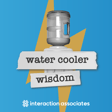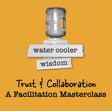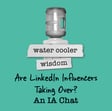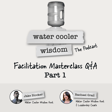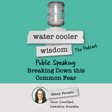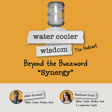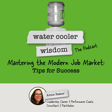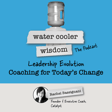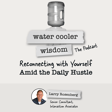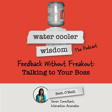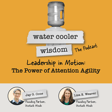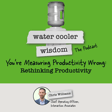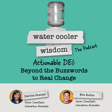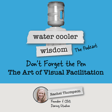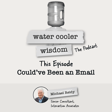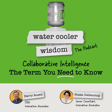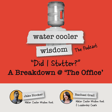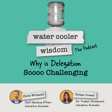Become a Creator today!Start creating today - Share your story with the world!
Start for free
00:00:00
00:00:01

Mindfulness and the Enneagram: Tools for Transforming Leadership
In this episode of Water Cooler Wisdom, we’re joined by leadership coach Susan DeGenring to explore how the ancient traditions of mindfulness and the Enneagram can be used to enhance leadership and personal development. Susan shares insights on how these tools help leaders and individuals better understand their personality patterns, improve self-awareness, and navigate challenges in the workplace. Tune in to discover practical strategies for integrating mindfulness and the Enneagram into your leadership toolkit.
Transcript
Introduction to Watercolor Wisdom
00:00:10
Speaker
In today's episode, Watercolor Wisdom, we dive deep into the intersection of ancient wisdom and modern leadership. Susan DeGeneres brings her expertise on the Enneagram and mindfulness, exploring how understanding our personality's operating system can transform the way we lead and grow. Get ready to uncover the hidden drivers of behavior and learn practical tools for mindful leadership.
Hosts Introduce Themselves
00:00:38
Speaker
Hello, and welcome to another episode of Water Cooler Wisdom. I am Jake Blocker. And I am Rachel Grail. Great to see you again, Rachel. Yes, good to be here, Jake.
Enneagrams and Mindfulness Discussion
00:00:49
Speaker
Always a pleasure to see you too. So today, we're we're kind of digging into Enneagrams and kind of mindfulness and the connection there. Enneagrams being one of the many assessments that are out there. There's so many assessments out there. There's so many. I mean, disc, Myers-Briggs, Enneagram, and that's just the three I'm thinking of right now, but I know there's a hundred and fifty-five more, at least. Clicked in strengths, see a human element, and on and on and on. What color is your parachute, I think is another one. Oh, yeah. I remember that one. Yeah. What are your thoughts and feelings around these, all these assessments and
00:01:25
Speaker
You know, i I do love an assessment because I love a point of entry for conversation. And I think self-awareness is always a good place to start.
Skepticism Towards Personality Assessments
00:01:38
Speaker
And I have to be honest that I'm a little suspicious and and have been a little skeptical of any assessment that says, oh, well, you're this thing. And there's like, you will always be this thing. That kind of deaf defining ourselves by a category. I think anything that feels like limited and incapable of growth or change, I'm like, I side-eye that a little bit. Yeah.
00:02:06
Speaker
Yeah, I completely agree. Cause I was a, I was a diehard Myers Briggs. I was a, uh, you know, I love Myers Briggs. I would friends, a friend and I would, you know, just discuss this all the time. Guess what other people were. if We were pretty accurate most of the time, by the way. But, uh, I kinda, I got the, over the years, I felt the same way of myself as an introvert. I was like, all right, well, that's why I can't do anything. That's why I can't.
00:02:33
Speaker
I'm terrible in social settings and so I'm just never going to be good in social settings. Very convenient. Yeah, sorry. i an like I guess I'll stay home tonight. I'm too introverted. No, thank you. I'm stretching. no But I think it was once I could kind of let that go. I felt a little bit more at ease with doing things and still won't catch me in many social settings, but I do my past.
00:02:59
Speaker
I will say that I did have the benefit of getting my Enneagram done by our guest today. And she walked me through it and she used a really thorough
Introducing Susan DeGeneres
00:03:11
Speaker
assessment. And what I found in it was that there was actually a lot more flexibility and opportunity for growth than I had to originally sort of judged. So i yeah I had to look at my own bias there. And and when I did dive into it, I was like, Oh, actually this, this can be an opening for just a little bit more context, a little bit more awareness, and in some ways be a catalyst for growth by having that. So I changed my mind somewhat before all you any fans come first.
00:03:47
Speaker
ah yeah um So I'm excited to talk about it today. I think I think it'll be really an insightful conversation. Love it. Well, I think that's a perfect segue to roll it right into it. So you
Understanding Enneagram and Mindfulness
00:03:59
Speaker
ready to get going? Yeah, let's dive in.
00:04:01
Speaker
All right, well, welcome back, Susan. Let me give you a reminder of who Susan is. So Susan is a senior consultant for Interaction Associates and former director of product development for Interaction Associates. She's also an organizational mindfulness teacher and professional Enneagram leadership coach and the founder of Still Mind Coaching Solutions. Welcome back, Susan. Great to have you. Thank you. Always great to be here with you too.
00:04:31
Speaker
Yes. So Susan's coming to us with a topic of leadership and and individual developments on which billions are spent each year in organizations with a distinctive perspective based in both of these traditions, the Enneagram and the mindfulness. So Susan, just to kick this off a little bit, can you briefly define these two things for us, the Enneagram and the mindfulness? Sure. So the Enneagram,
00:04:58
Speaker
is a personality assessment with really ancient roots going way back to the time of Pythagoras and um Aristotle and way back. um And right now in modern times, it's used to help people see the inner workings of their personality, I like to say.
00:05:21
Speaker
you know We've all got gifts and virtues, and we've all got blind spots and defense mechanisms that we engage in. And a lot of these are unconscious. And so the Enneagram does a really great job at helping bring them to more conscious awareness so we can do something about them. And I use it in my coaching practice all the time. It's a most amazing tool.
00:05:49
Speaker
And mindfulness is also a tradition with ancient roots. You know, it's in the contemplative practices of many of the world's, you know, great major religions, including Christianity, Judaism, Islam, and of course, it's most well known for Buddhism. But lately, the last 10 or 15 years, as the science neuroscience technology and research has evolved,
00:06:20
Speaker
The non-spiritual secular form of mindfulness has become the subject of a lot of attention from organizations for the benefits it can bring to help people improve their performance, their self-awareness, their ability to recover from burnout, their ability to manage manage stress, et cetera. so um And when we say mindfulness, we simply mean, and this is the classic John Kabat Zinn definition, the awareness that arises from paying attention on purpose in the present moment without judgment. So both of these tools from ancient traditions have profound applications and impacts today in organizations.
00:07:10
Speaker
I love that. i I've always felt that awareness is kind of the starting point for any kind of change or growth. yeah So for our listeners, could you paint a picture
Leadership and Personality Traits
00:07:22
Speaker
for us? What is the integration of these two traditions look like in the world of leadership and an individual development? you know How does this show up?
00:07:33
Speaker
Well, you know, the premises as leaders, let's talk about leadership first, you know, our jobs are broadly speaking, obviously, to manage people and processes towards a goal. We all know that because we've all been in leadership positions, action associates. And for individuals or colleagues, you know, we also need to manage our relationships and our processes. So,
00:07:59
Speaker
we can collaborate so that we can embody what we call it IA collaborative intelligence as we work together to produce something. And some people seem to be better at it than others. And sometimes the why of that is a mystery. Is it nature? Is it nurture? How does this all happen? So as an example,
00:08:23
Speaker
Did you want to say something? right Oh, I was just going to say, some people are better than it at it than others, and some days it's easier than others. right Exactly. Right. So as an example, you might have a leader who's this incredibly visionary, upbeat, inspiring kind of leader. People love him. They want to be on his teams. They want to follow him. He's warm. He's highly personable and engaging. and people feel really valued and good in his presence. I'm sure, hopefully, our listeners and you two will have experienced people like that. But sometimes, you know, after a time, people, the the sort of bloom goes off the rose and they start to feel disappointed.
00:09:09
Speaker
or disenchanted because he doesn't stick with a plan. He doesn't move the projects forward without, you know, changing course or re-envisioning or going after the latest shiny objects and creating a new plan and then creating a bit of chaos. So, right? So is he a bad leader? You know, in the traditional way that people might look at leadership and organizations, they might say, yeah,
00:09:40
Speaker
This guy is a problem leader. I say no. I say he's just at the mercy of his personality structure and unaware, speaking of awareness, Rachel, unaware of what's driving this behavior.
00:09:52
Speaker
yeah like I like that personality structure. and Could you go into that just a little bit more? What impact does that have in the ways we behave at work, our personality structure, as you say? Yes. Yeah, I like to call it our Personalities Operating System, our POS. Well... It means other things too. Right. Okay, it does. It does. Okay. I guess. Touché, Jake. Touché.
00:10:23
Speaker
Some people are like, yes, very applicable, very relevant. yeah Anyway, please give continue. That's all right. So you guys, we all have the best and the worst in us, and our personalities span a continuum of behavior. And we're not just one sort of unified, calm, in control consciousness that behaves perfectly all the time. Would it be so, but it's not.
00:10:48
Speaker
despite what people expect of us, you know, our partners or our bosses or some idealized competency models claim we should aim for in terms of our behaviors. So lots of things throw us off balance. There are things on the outside, of course, like, you know, okay, there's organizational context, like there's a bit of merger and your job is threatened or,
00:11:17
Speaker
There's pressure of insane milestones or difficult relationships you have with people you work with. But there's also these internal variables such as what motivates you? What are your fears? What are your defense mechanisms?
Mindfulness and Behavioral Awareness
00:11:33
Speaker
And what's in your blind spot? And these are all functions of this personality operating system which underwrites really specific behavior patterns.
00:11:46
Speaker
Why do I respond to stress the way I do or conflict? Why does telling someone they're not doing a good job give me so much anxiety? um what can i How can I assert my authority you know when people aren't complying? All these kinds of things, why is talking to people so much more challenging for me? Can I just do my work and sit at my computer? That's what I'm good at. you know these All these questions about who we are, what's happening in our life are all governed, and as I'll talk about in a minute, largely unconsciously by our brain.
00:12:27
Speaker
and And it drives also these more existential questions like, how can I be more fulfilled in my life? Or who am I, what am I meant to be doing? Am I really doing what I want to be doing? So all of these things are in the realm of the Enneagram because the Enneagram, unlike um some other personality assessments, is deeply rooted in the motivations and unconscious fears and defense mechanism that drive our behavior and figuring out, okay, bringing those to awareness.
00:13:06
Speaker
and then choosing what to do about them. This seems like a ah perfect time to bring in that second piece around mindfulness. yeah ah We know that you've got a ton of really great training in this space and expertise in this. So how can one apply mindfulness as a tool once this new insight about our personalities comes to the surface for better words? Yes.
00:13:33
Speaker
Sometimes when I'm working with Enneagram clients um and coaching them, it can be a little bit of a confrontation about you know what what's been driving them that they're unaware of. And mindfulness is a mechanism for helping to both put awareness on what you want to be looking at, but it also holds within it as a practice um Attitudes of, you know, kindness, self-acceptance, non-judgment. So anyway, so those two go together as ah in in in our own personal and professional development. And I would say one of the reasons mindfulness is such a great companion in talent development is for that reason, so they can become aware of and understand the levers
00:14:32
Speaker
that you know drive our behavior like that guy that I just spoke about who happens to be an Enneagram seven point. And um you know that particular personality structure, that personality operating system is really driven by the need to experience it all and avoid boredom or pain. yeah So,
00:15:01
Speaker
If that guy had the opportunity to learn that about himself, there's lots of things that he could learn to do differently. And the most important thing about it is what mindfulness in the neuroscience tells us is that much of that personality operating system is unconscious and unconscious like And when I learned about this stuff, I was blown away. So our brain is different than our mind. So our brain is the organ, and it's a machine. It's a computer. And it can process information at 100 million bits per second. I don't know how big a bit is, but it's big.
00:15:48
Speaker
a hundred million of whatever it is is big, but only 50 to 60 bits per second actually makes it to our conscious mind. So that's like 99.99% of our mental faculties are underneath our consciousness. So what our brain learns and analyzes and decides to focus on and bring to our conscious awareness is huge. So in there is all that other stuff, all this behaviors, all that neural wiring that got laid in place when we were, you know, infants and young children is all unconscious.
00:16:37
Speaker
So what's a brick that explains so much? written and That's just such an insightful statistic. I feel like it explains so much. It does explain a lot. And why I like pairing these two ancient traditions is because once you understand that your personality is operating system, in other words, the seven type Enneagram is the enthusiastic visionary,
00:17:07
Speaker
Once he learns that it's not he's not bad or wrong, science tells us you're not bad or wrong. The Enneagram tells us you're not bad or wrong. You are just operating how your operating system is designed.
Making Conscious Choices with Mindfulness
00:17:25
Speaker
So once you understand and can become aware of these levers, you can do something about him. And again, this is where mindfulness comes in because mindfulness One of the versions of mindfulness is all about attention. So ah focusing attention. you know You don't have to sit on a cushion for two hours a day and focus on your breathing as a yogi aesthetic. You can sit at your desk for four minutes a day.
00:18:00
Speaker
and focus on your breathing and it will start rewiring your neural pathways away from what we call that scattered monkey mind. And you guys have heard that, you know, our brain, our brain just is, you know, looking everywhere all the time for anything that's going to threaten it or that's going going to allow it to be safe. So, you know, a Mishi Jha who is a,
00:18:30
Speaker
a neuroscientist who runs a neuroscience lab in the University of Miami, university of miami excuse me and she's been studying the attention system of the brain for 15 years. And what she has said is, attention is the boss of the brain. Where your attention goes, the rest of your brain's computational powers will follow.
00:18:57
Speaker
So attention is ah important and mindfulness helps you um really manage your attention and get away from what is now called attention deficit trait in organizations. It's like ADHD in kids, but it's not genetic, it's environmentally created. So you put these two things together, the Enneagram where you get to see your patterns and the ability to be non-judgmental and more present to what is so without getting totally triggered into your defense mechanisms makes it means that you can make choices about how you want to be. right
00:19:47
Speaker
can redirect and and start to drive the bus yourself. but Exactly. That's exactly right. I love that analogy. Yeah. There's ah there's a thing in when you're riding a motorcycle, they they teach you to, when you're coming up in a tight turn, they teach you not to, if you look ahead, you'll you'll go where you look. So they teach you to look through the turn.
00:20:10
Speaker
And that just comes to mind for me that if there's a bit of, um, I think a default mode to like answer all the pings as they come in and be, Oh, some, something's grabbing my attention. but's But if I can put my attention on where it is that I want to go ultimately and have some awareness of those default modes and strategies, it becomes, I love what, how you said, now we have a choice. Now we have some of our own agency.
00:20:38
Speaker
in the matter, and isn't that what development is all about? To
Overcoming Self-Criticism with Positive Tools
00:20:42
Speaker
say, I'm going to decide how I respond. Right. rather than yeah And that moment of awareness, and ah Sharon Salzberg calls that ah famous mindfulness teacher, the magic moment. you know That moment when you catch yourself engaged in this, oh, I have to experience it all. and you know, I don't want to, I don't want to get bored. I'm afraid of that. And that instinct for that seven leader to go, Oh, that's a, that's a great thing we should be doing. Let's start that. We'll, we'll sort of abandon that strategy and go to this strategy. with treches As a seven, this is very familiar. I didn't choose that point intentionally, but I chose it because it's very recognizable. I love it. Yeah, I mean, Rachel, you could speak to now that you're more aware of some of those underlying defense mechanisms or fixations and how they have directed your behavior over the years.
00:21:50
Speaker
Yeah, it's been it's been really powerful to to just notice that. And in a way, I feel comforted by the fact to say, oh, it's not just something that's wrong with me that I lack focus and discipline. I'm just very enthusiastic and excited about what's possible. And so recognizing when it is that I need to make a choice to follow through and also getting the right level of support when I'm collaborating with others, it's been really powerful to have this insight.
00:22:20
Speaker
I'm so glad to hear that. and And, you know, you're making me really think again about there's I just read a recent article about, you know, why being self critical does not help us change our habits.
00:22:40
Speaker
and And part of the reason of for that is because it triggers us back into this default you talked about default mode this default that our brains which you know for 1.99 million years of being on the Savannah and having to be alert for any threat whether it's Fauna or flora or weather or whatever um The default pattern is towards negativity and reactivity Mm-hmm
00:23:10
Speaker
That's how our brains are designed. there's We could talk about that in a whole nother podcast. but um So you know if you can cut into that ah automatic reactivity, you then have the chance, that gap between when you get stimulated by something and when you respond or react, that's the gap. That's awareness. And that's when you can make different choices.
00:23:39
Speaker
according to the science and according to me and other people that I've spoken with. But it's so forgiving. The Enneagram is so forgiving for that reason. And mindfulness as a practice is so forgiving. I'm i'm i'm a fan, as you can tell. I love this. It's very powerful. very powerful Well, I wish we could keep talking about this forever because you have such a wealth of of experience and information. It's been so engaging to hear from you. um my My full disclosure is I found out I was a seven because I got coaching with Susan and I learned so much about my Enneagram type. And if you're interested in finding out more about Susan's work, you can search for her
00:24:26
Speaker
leadership coaching approach using both the Enneagram and mindfulness on linkedin dot.com slash in slash Susan degenering. And we'll link that in our pod in this podcast. So you can find her there, or you can also go to her website still mind coaching solutions.
00:24:45
Speaker
And we just have a few last hard-hitting questions. for you but Okay, then I'm very mindful because you know, before breathing exercise before it started there's no threat here. There's no there's no tiger waiting. So this is our our water cooler chat questions. Susan, do you prefer coffee or tea in the morning?
00:25:11
Speaker
coffee most definitely, although I'm only a recent convert because I wasn't able to drink coffee for many, many years because it was it triggered my, you know, I
Susan's Personal Insights and Recommendations
00:25:22
Speaker
just couldn't process it. It made me so hyper, but now I love it and I can't be without my morning cup of tea. Now that you have such a strong mindfulness practice, the coffee just is a negative impact. A morning or evening work style?
00:25:41
Speaker
Uh, I would say morning, but not early morning. good get Until you've had the coffee. yeah not until i know i'm Not a morning person, but once I get going, I do my best work probably in the morning. Yeah. What is an app or a platform that you swear by for your work? Well, um, I guess this wouldn't surprise anybody, but I love,
00:26:12
Speaker
Headspace, which is a, not Headspace, I'm sorry, that's a good one too. I meant 10% Happier. 10% Happier is a website that has an enormous, it's it was created by Dan Harris who used to be ah um an anchor on major network television until he had a panic attack.
00:26:36
Speaker
in the middle of a broadcast and that sort of spurred them on to start looking into things. And one of the things they started looking into was mindfulness. So long story short, um it's a fabulous app and I use it myself and give it to my clients, et cetera. It's really great. Headspace is also really great. I want to check that out. I've used Headspace, but not 10% happier. What's a book that's made an impact on you?
00:27:02
Speaker
Well, if you look at my shelf, you'll see about 20 books on the Enneagram. But I will say um there's a book that ah that I started reading called Radical Collaboration.
00:27:19
Speaker
Five Essential Skills to Overcome Defensiveness and Build Successful Relationships. And that book has had a huge impact on me because it really talks a lot about these same practices.
00:27:32
Speaker
these same things about becoming aware of who you are and what you're doing as a way to get out of your own defensive patterns and work better together with others. Nice. And last but not least, um if you could have a water cooler chat with anyone dead or alive, who would it be? I lived in South Africa for a large part of my early my teens and my early twenties. And so of course, I never thought apartheid would fall in my lifetime. It was still fully entrenched. So for me, it would be the two architects of the downfall of apartheid, Nelson Mandela, of course,
00:28:24
Speaker
see And um Prime Minister who was in power at the time. ah Anyway, I can't think of his name, but I'd like to talk to those two to see how they come from such day diverse parts of the you know political and social order to change a state of, um you know,
00:28:53
Speaker
racial inequity and so on and so forth. Pretty amazing. Yeah.
Conclusion and Contact Information
00:28:58
Speaker
Fascinating conversation. Thank you. That was fun. Thank you. Always. have to talk Yeah. Thank you so much, Susan. This has been a great conversation and it's great to have you. I'm sure we'll have you again. It sounds like we have much more we can talk about. So thank you again. Thanks for having me. And thanks everyone. And we'll catch you next time at the water cooler. Bye everyone.
00:29:23
Speaker
Thanks for listening to Water Cooler Wisdom. This podcast is brought to you by Interaction Associates, a leading professional development and leadership training organization whose mission is to help people work better together. If you'd like to learn more, visit interactionassociates dot.com. If you have questions, comments, or are interested in collaborating with this podcast, you can email us at watercoolerwisdom at interactionassociates dot.com.
